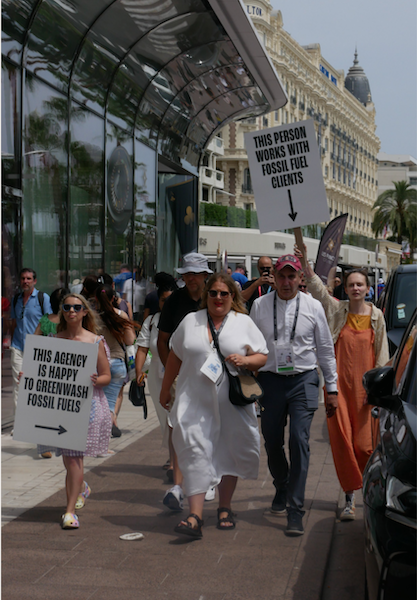According to Nozuko Noni Poni, Campaign Manager at Clean Creatives, in South Africa, the reality of climate change has become undeniable, with extreme weather events like floods and heatwaves wreaking havoc. Yet, the fossil fuel industry and its enablers in advertising and PR persist in obstructing genuine climate progress through increasingly sophisticated greenwashing campaigns. This strategy, where companies falsely present themselves as environmentally friendly, is not just misleading, it is a direct threat to meaningful climate action.
Greenwashing thrives on deception. It misrepresents harmful industries as allies of sustainability, diverting attention from their destructive practices. A striking example is the campaign for the East African Crude Oil Pipeline (EACOP) in Uganda, run by a South African agency, which aimed to ‘squash’ the negative PR from protests against the EACOP, a controversial project led by TotalEnergies.
The campaign, which won an award at Uganda’s Silverback Awards, reportedly employed ethically questionable tactics, including hiring influencers to counter environmental activism. The EACOP project has been condemned by the European Parliament for human rights abuses and is set to displace over 100,000 people. Despite international condemnation, such campaigns persist, showcasing how greenwashing is wielded to silence climate activists and bolster harmful industries.
The impacts of these tactics extend beyond public relations. In South Africa, communities near fossil fuel sites suffer devastating consequences: polluted air and water, lost livelihoods and mounting health crises. By portraying themselves as sustainable, fossil fuel companies avoid accountability, delaying urgent transitions to cleaner energy. The cost is measured not just in environmental degradation but in human lives and well-being.
The Role Of Marketing In Greenwashing
Advertising and PR agencies are complicit in perpetuating this deception. They craft narratives that obscure the environmental damage caused by their clients while eroding public trust in genuine climate action. As awareness of greenwashing grows, scepticism spreads — not only towards individual companies but towards entire industries. This backlash undermines legitimate sustainability efforts, creating a vicious cycle of distrust and inaction.
Moreover, agencies risk alienating future creative talent. Today’s young professionals, deeply concerned about climate change, are unlikely to align themselves with organisations that prioritise profit over planetary health. For agencies, working with fossil fuel clients is a reputational gamble that could cost them the brightest minds of the next generation.
Why South Africa’s Marketing Industry Needs To Change
The stakes in South Africa are uniquely high. The fossil fuel industry’s influence here directly undermines the country’s commitments under the Paris Agreement and its newly passed Climate Change Act. Beyond the legal and environmental imperatives, the marketing industry has an ethical duty to refuse work that enables the destruction of communities and ecosystems, or at least begin to put processes in place to phase out this work. Agencies can drive change by choosing ethical partnerships over complicity in greenwashing.
There is also a financial argument for pivoting to sustainable clients. As the global economy shifts toward clean energy, brands committed to genuine sustainability will gain prominence, presenting lucrative opportunities for agencies willing to lead the charge.
The Path Forward
To combat greenwashing, South Africa’s marketing industry needs to:
1. Commit to transparency: agencies should adopt clear ethical guidelines about which clients they represent and disclose these relationships publicly.
2. Educate consumers: by equipping the public with the tools to identify greenwashing, agencies can help build demand for authentic sustainability.
3. Support regulatory action: advocate for stricter laws governing environmental claims in advertising, ensuring companies cannot mislead consumers without consequences.
4. Embrace Clean Creatives: agencies can pledge to refuse fossil fuel clients, aligning their work with the values of environmental and social justice.
The creative industry has a unique platform to influence public perception and corporate behaviour. By moving away from fossil fuel clients, South African agencies can shift the narrative, championing honesty and accountability over profit-driven deception. This isn’t just about saving the planet — it’s about preserving the integrity of an industry that shapes how we see the world; much like marketing and brand consultancy agency DNA Brand Architects, who have made a public stand against fossil fuel clients.
South Africa’s floods, droughts, and fires are stark warnings of what’s at stake. The marketing industry must recognise its power and responsibility in shaping a sustainable future. The question is no longer whether change is necessary but whether agencies will lead that change or remain complicit in the destruction of our planet.
CLEAN CREATIVES SOUTH AFRICA
noni@fossilfreesa.org.za
https://cleancreatives.org/southafrica










